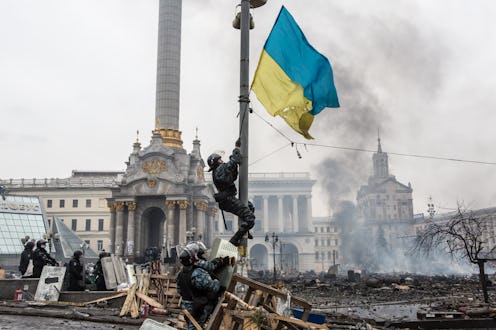News
Ukraine Reaches Cease-Fire Deal With Russia
European leaders announced on Thursday that Ukraine and Russia have reached a cease-fire agreement after nearly one year of conflict in eastern Ukraine. The peace is set to begin on Sunday. Russian President Vladimir Putin, German Chancellor Angela Merkel, French President Francoise Hollande and Ukrainian President Petro Poroshenko announced the cease-fire from Minsk, Belarus, following a series of talks and the threat of U.S. lethal aid backing Ukrainian fighters.
"We now have a glimmer of hope," Merkel said at a press conference on Thursday. "I can say what we have achieved gives significantly more hope than if we had achieved nothing."
In a statement to the press, Putin urged both sides of the conflict — the Russian-back separatists in eastern Ukraine and the Ukrainian military — to "show restraint" in the days leading up to the cease-fire. Come early Sunday morning, both parties will have to pull back their artillery and create a "security zone" of at least 50 kilometers from the front line, according to the Kremlin. Putin said this was necessary "in order to avoid unnecessary excessive bloodshed and casualties."
"Representatives of the Ukrainian authorities believe their troops have not been surrounded and therefore think this process will go sufficiently smoothly," the Russian president said, adding that he had "some initial doubts."
Putin continued:
Eventually, we agreed with President Poroshenko that we will instruct our experts – I am ready to do so – to establish what is actually going on there. In addition, I will repeat, we will try to develop a set of measures to verify the implementation of our decisions by both sides.
The Kremlin outlined the conditions of the cease-fire, stating on its website that armed forces in the eastern Ukraine regions of Donetsk and Lugansk have 14 days to withdraw their heavy weapons, and the withdrawal should begin no later than the second day of the cease-fire. The rebel-held regions will also have to hold new local elections under Ukrainian law. These regions previously held elections last fall, but Ukraine and Western Europe said they were a sham.
The cease-fire arrangement also allowed Ukraine to once again gain control of its banking system in the rebel-held regions, the Kremlin said. While the rebel-held regions of Donetsk and Lugansk will be granted a special status under a new Ukrainian constitution, they will not become autonomous territories — a win for Ukraine and a loss for Russia, which has been fighting for federalization of these eastern Ukrainian regions. However, these regions will be given wider powers in exchange for Ukrainian control over the Russian-Ukrainian border, including the freedom to trade with Russia.
According to the Associated Press, Russian separatist leaders in eastern Ukraine were happy about the cease-fire agreement on Thursday, though they were still skeptical of the Ukrainian government in Kiev.
Luhansk rebel leader Igor Plotnitsky reportedly said on Russian television: "[We] give this chance to Ukraine to change its constitution, to change its attitude." However, another rebel leader warned that if the cease-fire is violated, the Russian-backed rebels would place the blame on Kiev.
In a joint statement, the four world leaders said:
They firmly believe that there is no alternative to an exclusively peaceful settlement. They are fully committed to undertake all possible individual and joint measures to this end.
Images: Getty Images, The Kremlin
